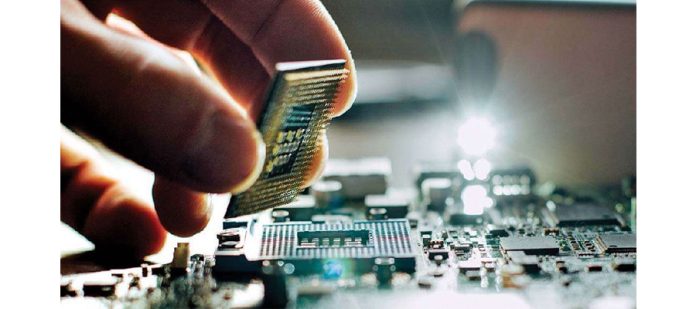The electronics industry has long been a beacon of innovation, driving progress in various sectors and reshaping the way we live and work. From the invention of the transistor to the development of smart TVs, this industry has consistently pushed the boundaries of what is possible. As of 2022, the Indian consumer electronics market proudly held a valuation of USD 73.73 billion. Projections paint an optimistic picture for the years ahead, with an expected compound annual growth rate (CAGR) of 6.8% from 2023 to 2030. This growth trajectory firmly situates India as a global epicentre for short to medium-term expansion in consumer electronics expenditure.
Furthermore, the driving force behind this surge is the escalating demand for cutting-edge consumer electronic devices distinguished by advanced features and enriched functionalities. Let’s explore some of the highly influencing innovations and developments which are shaping the future of electronics.
Artificial Intelligence (AI)
Artificial Intelligence (AI) is swiftly emerging as a pivotal component within the electronics sector. As smart factories, interconnected supply chains, and digital supply networks gain prominence, AI is already demonstrating its capacity to elevate productivity levels, delivering enhancements of no less than 12%.
In the electronics industry, AI is used for image and speech recognition, natural language processing, and predictive maintenance, among other applications. As AI continues to advance, it will unlock new possibilities for automation, personalisation, and problem-solving across industries. For example, in a smart TV, AI enhances user experiences by personalising content recommendations. By analysing viewing habits and preferences, AI algorithms suggest tailored movie and show selections. Voice recognition allows users to interact effortlessly, while AI-powered image upscaling optimises picture quality, delivering a more immersive and enjoyable entertainment experience.
Next Generation Materials
Innovation in the electronics industry is closely tied to the development of new materials. Novel materials like graphene, carbon nanotubes, and 2D semiconductors have the potential to revolutionize the field by enabling faster, more energy-efficient, and flexible electronic components. For instance, graphene is an exceptionally strong and conductive material that could be used in everything from faster-charging batteries to flexible and transparent displays. Research in advanced materials continues to open up new possibilities for electronics, with applications in energy storage, displays, and even quantum computing.
Sustainable Electronics
Sustainable electronics represent a crucial shift in the tech industry, emphasizing eco-conscious design, responsible sourcing, and extended product life cycles. These devices are designed with energy efficiency in mind, utilising renewable materials, and reducing e-waste through repairability and upgradability. Manufacturers are prioritising recycling programs and reducing hazardous components, making electronics less harmful to the environment. Additionally, sustainable electronics encourage consumer behaviour by promoting responsible disposal and recycling. By embracing sustainable principles, the industry aims to minimise its carbon footprint, conserve resources, and ultimately create a more environmentally friendly and socially responsible technology landscape for future generations.
Miniaturisation
This trend has given birth to an array of wearable technologies, such as smartwatches, fitness trackers, and augmented reality glasses. These devices are becoming increasingly sophisticated, offering health monitoring, immersive experiences, and seamless connectivity. Innovations in microelectronics, sensor technology, and energy efficiency have played a pivotal role in making these devices smaller, more powerful, and longer-lasting.
Internet of Things (IoT)
The Electronics industry is experiencing a profound wave of innovation driven by the Internet of Things (IoT). IoT involves the connectivity of everyday objects to the internet, enabling them to gather and share data. The innovation within IoT encompasses the development of energy-efficient, long-range communication protocols, cutting-edge sensors, and powerful edge computing devices. These advancements empower the creation of intelligent, interconnected systems that enhance efficiency, convenience, and safety across various domains. According to research conducted by Markets and Markets, the global IoT market in smart cities is expected to reach a substantial value of $260 billion by 2025, with a remarkable compound annual growth rate (CAGR) of 18.1% during the forecast period. This presents a huge opportunity for businesses to capitalise on the growing demand for IoT solutions in cities.
Digital Scent Technology
Digital Scent Technology, a cutting-edge innovation, aims to revolutionise our sensory experiences by digitising and replicating scents. Using a combination of hardware and software, this technology captures and recreates fragrances, enabling us to transmit and perceive smells through digital devices. Beyond enhancing entertainment and virtual reality experiences, it holds promise in diverse fields such as healthcare, food, and marketing. In healthcare, it can aid in diagnosing illnesses through scent analysis, while the food industry can use it to simulate flavours. Moreover, marketers can employ digital scents to create immersive brand experiences. Digital Scent Technology opens up a world of possibilities, enriching our digital interactions with the olfactory dimension.
5G and Beyond
The rollout of 5G networks is another significant driver of innovation in the electronics industry. 5G promises faster data speeds, lower latency, and greater connectivity, paving the way for new applications and services. From augmented and virtual reality to autonomous vehicles and smart cities, 5G is enabling a new era of connectivity and innovation. Beyond 5G, research into 6G and beyond is already underway, with the goal of achieving even faster and more reliable wireless communication. These advancements will further expand the possibilities for innovative electronic devices and applications.
Gesture and Voice Control: Recent advancements in gesture and voice recognition technologies have revolutionised user-device interactions. These innovations significantly enhance accessibility and usability, particularly in scenarios where conventional touch screens are unfeasible or pose safety concerns. Users can effortlessly navigate and control their devices through intuitive gestures or simple vocal commands, amplifying convenience and efficiency. This breakthrough is propelling a new era of seamless and hands-free interactions, empowering individuals with more options to engage with technology in a natural and efficient manner.
Immersive Technology
Immersive technologies are a transformative solution addressing the challenges within the electronics manufacturing industry, where a heavy reliance on human labour can introduce errors and hinder overall efficiency. These cutting-edge tools provide a comprehensive approach to inspecting design elements at various scales, effectively identifying and rectifying defects during the design phase. They excel at detecting intricate circuitry flaws and common manufacturing errors, including issues like slivers, missing solder pads, and starved terminals, all before physical fabrication begins. Moreover, immersive technologies enhance workforce training, streamline prototype development, and simplify assembly maintenance by offering operators intuitive visualisations of complex workflows. As a result, they empower the electronics industry to optimise its processes and achieve higher levels of quality and productivity.
Conclusion
The electronics industry is a dynamic and ever-evolving field, characterised by continuous innovation. From the relentless drive towards miniaturisation to breakthroughs in advanced materials and the integration of AI and IoT, the industry continues to shape the way we live and work.
Innovation in electronics isn’t just about creating more powerful devices; it’s also about making them more sustainable and environmentally friendly. As we move forward, the electronics industry will continue to play a pivotal role in shaping our future, driving progress, and addressing some of the most pressing challenges of our time.









